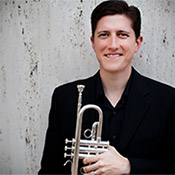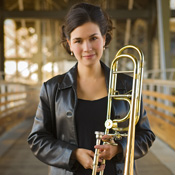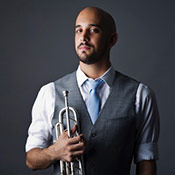Principal Trumpet Matthew Ernst: Striving to be “a servant of the music”
David Lewellen
PUBLISHED
Tagged Under: 2017.18 Season, Brass, MSO Musicians, Trumpet
When Matthew Ernst plays Copland’s Quiet City, he’ll know the story behind the piece, but he won’t be thinking about it.
That’s standard procedure for Ernst, the MSO’s principal trumpet. He knows that the piece began as incidental music to a play, he knows the plot of the play, he has pictures in his mind, but “I don’t want to be too gushy,” he said. “I bring the music to the audience and allow them to create their own landscape.”
Of course technique and emotional maturity are necessary, but at the highest levels, Ernst said, “A good musician can take it too far and become egotistical, and cease to be a servant of the music.” And Copland gave plenty of indications of dynamics and articulation — “everything you need is there.” That approach is something Ernst respects about MSO Music Director Laureate Edo de Waart, who hired him nearly two years ago. He remembers a rehearsal of Brahms’ Fourth Symphony in which de Waart said to the string section, “Those two notes don’t have to change the world.”
Ernst, along with English hornist Margaret Butler, will be in front of the orchestra for Quiet City, but he has spent more time working on his part for John Adams’ Harmonielehre, the major work on the second half of the program, which features a long, high, soft trumpet solo.
Trumpet players are notorious for carrying around multiple instruments, and switching on the same concert or sometimes in the same piece. As Ernst explains it, the B-flat is the basic horn, the one he warms up on every day. The C is the most common for orchestra playing. The D is suited for higher passages — he will play the Harmonielehre solo on a D trumpet, but use the C for most of the rest of the piece. And the sideways, rotary-valve trumpet is preferred for Romantic works and blends well with other sections.
“Matt is a great player, a wonderful artist, and he brings real leadership to the brass section,” said Alan Campbell, the MSO’s second trumpet. At Ernst’s audition, “everyone went, ‘Oh man, this is the guy.’” Sometimes in an audition it is hard to assess leadership, but in the final round, Campbell said, “he was like a method actor. Just turning from one piece to the next, you could tell he was inside the piece before the mouthpiece went on his face.”
While he was in graduate school, Ernst picked up a master’s degree in wind conducting from Southern Methodist University in Dallas, and thought briefly about becoming a band director before winning his first orchestra audition put him on a different track.
The prejudice against “band,” with multiple players on each wind part, is yielding to appreciation for “wind ensemble,” with one on a part, Ernst said. But, he added, “No one’s getting professional jobs with benefits in wind ensembles, unless it’s in the military.”
“But almost everyone in the wind section comes from a band background,” he continued. “All the repertoire is 20th or 21st century, so some of the hardest stuff I’ve ever played in my life was in wind ensemble. It’s where a lot of composers get their start, because wind ensembles are willing to play young composers’ music.”
Ernst lives in Shorewood with his wife, Janna, an accompanist and vocal coach, and their two school-age daughters. Listening to Janna work on operatic repertoire with “the world’s best singers right in my living room” has improved his own playing over the years. “I think about vowel, the oral shape that I’m making.”
In Milwaukee, Ernst finds “the perfect balance of big-city comforts and small-town feel.” He appreciates his 12-minute commute to work, and being able to afford a house that close. The family’s house was more affordable than it might have been because it needed a lot of work — but Ernst is also a skilled painter and carpenter.
“I’ve played in a lot of orchestras, and the people here are amazing,” Ernst said. “And it’s not just the musicians. There’s an atmosphere of trust. You’re not going to be judged if you miss one note. The people play really well, and they’re amazing people. That’s really unusual in this business.”



